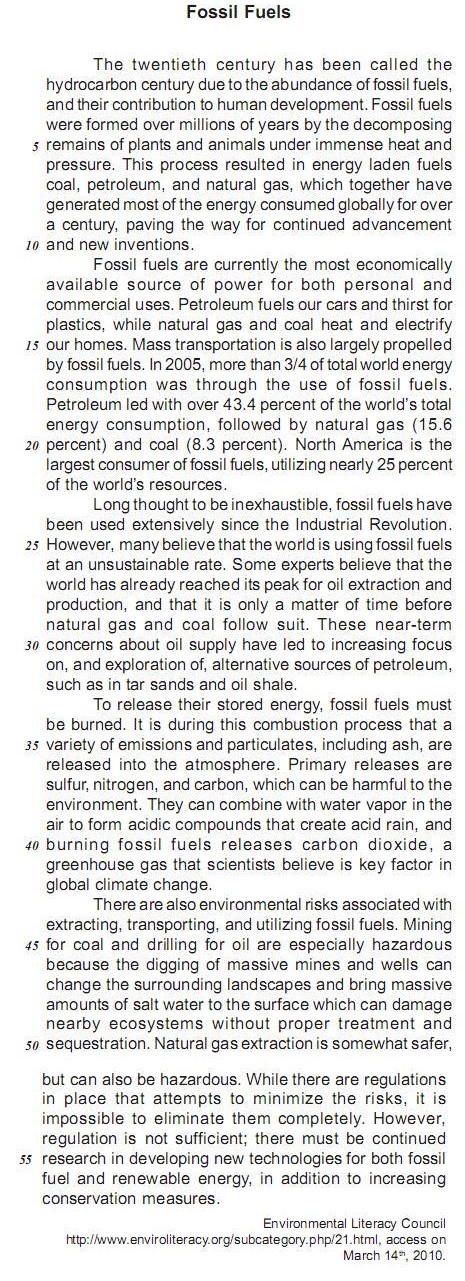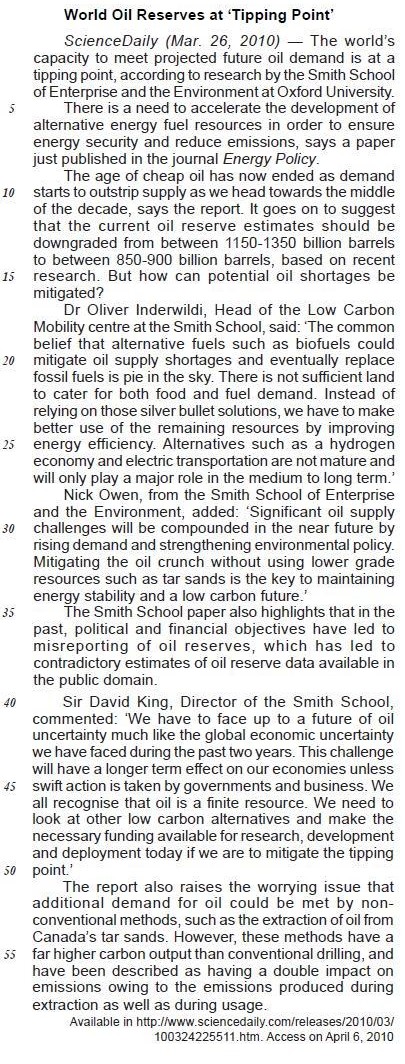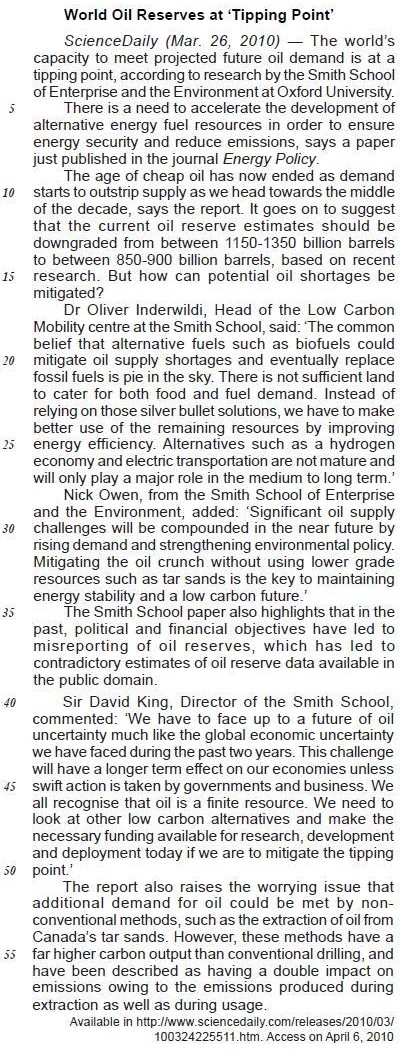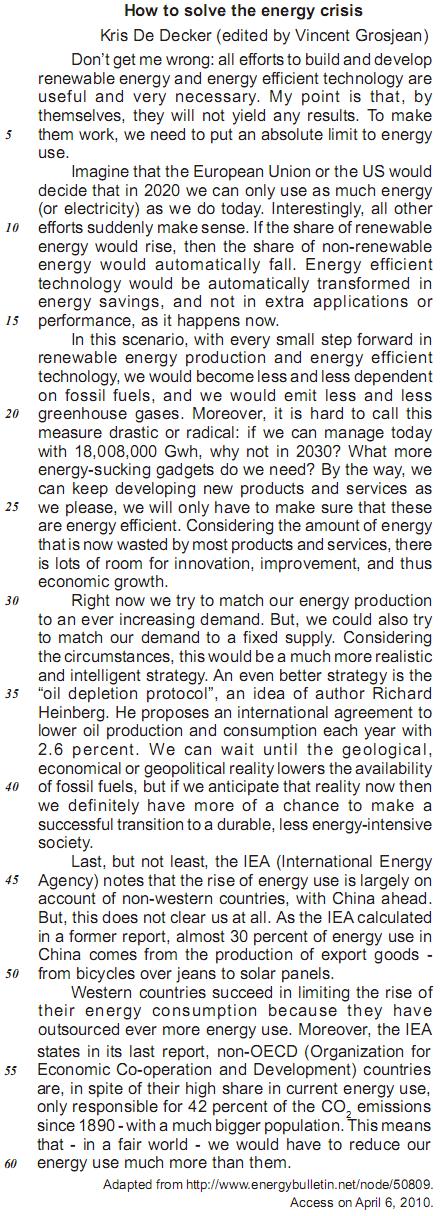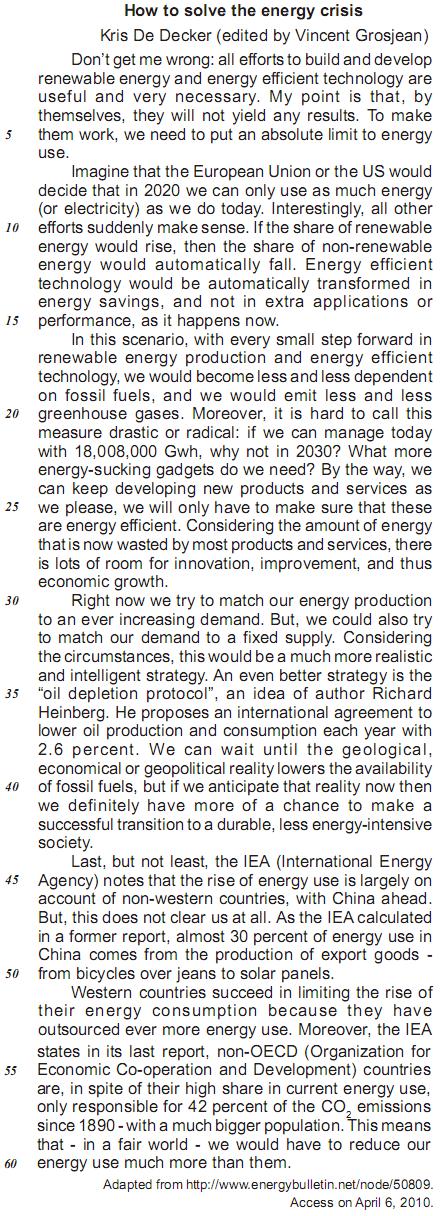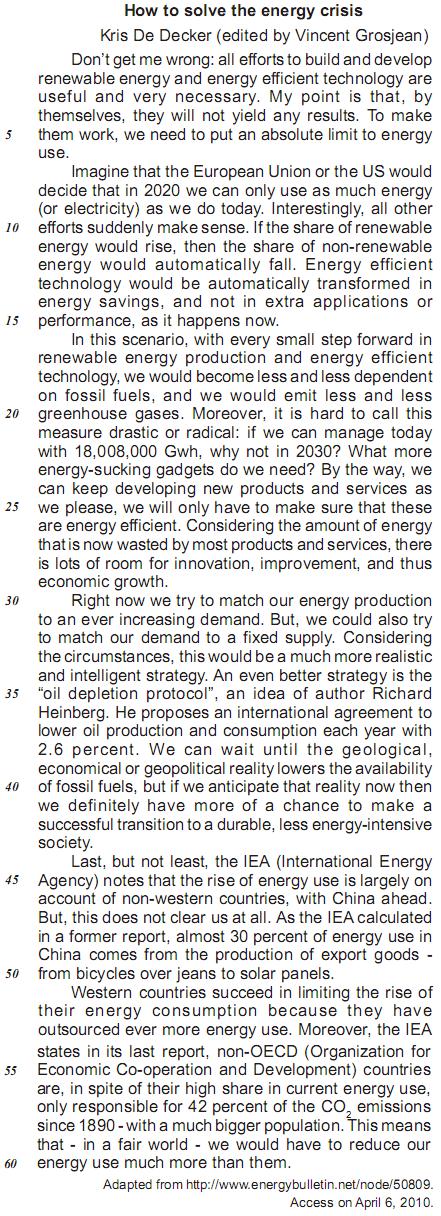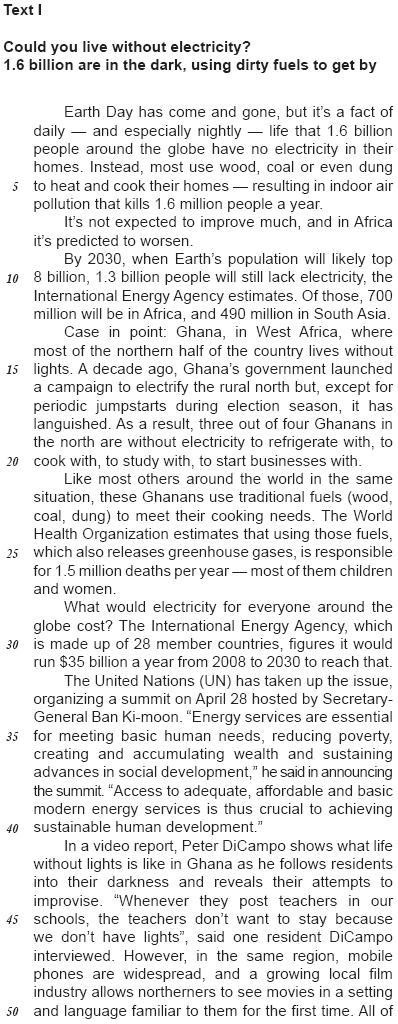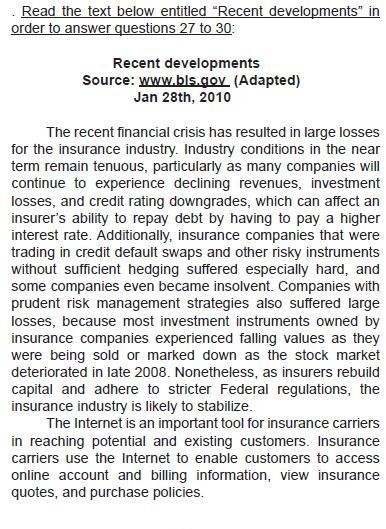Text 2
Source: The New York Times November 11, 2009 [slightly adapted]
Trucks, Trains and Trees
By THOMAS L. FRIEDMAN
No matter how many times you hear them, there are some statistics that just bowl you over. The one that always stuns me is this: Imagine if you took all the cars, trucks, planes, trains and ships in the world and added up their exhaust every year. The amount of carbon dioxide, or CO2, all those cars, trucks, planes, trains and ships collectively emit into the atmosphere is actually less than the carbon emissions every year that result from the chopping down and clearing of tropical forests in places like Brazil, Indonesia and the Congo. We are now losing a tropical forest the size of New York State every year, and the carbon that releases into the atmosphere now accounts for roughly 17 percent of all global emissions contributing to climate change. [.]
"You need a new model of economic development - one that is based on raising people's standards of livingby maintaining their natural capital, not just by converting that natural capital to ranching or industrial farming or logging," said José María Silva, a conservation expert. Right now people protecting the rainforest are paid a pittance - compared with those who strip it - even though we now know that the rainforest provides everything from keeping CO2 out of the atmosphere to maintaining the fl ow of freshwater into rivers.
The good news is that Brazil has put in place all the elements of a system to compensate its forest-dwellers for maintaining the forests. Brazil has already set aside 43 percent of the Amazon rainforest for conservation and for indigenous peoples. Another 19 percent of the Amazon, though, has already been deforested by farmers and ranchers.
The writer 's view of Brazilian action shows
Text 3
Source: http://www.forbes.com/2009/10/12/brazil-etf-emerging-intelligentinvesting-markets.html
Buy Into Brazil
David Serchuk [For bes Magazine]
There's a lot to like about South America's biggest
economy. Hosting the Olympics and World Cup doesn't
hurt either.
Suddenly everyone is talking about Brazil. This makes sense considering that the colossus of South America out-hustled President Obama and his hometown of Chicago to land the 2016 Olympics. It has also benefi ted by being the "B" part of the BRIC group of emerging nations, in addition to Russia, India and China. It's an emerging power that some investors have just learned about, though the pros have been hip to it for some time.
From 2003 through 2007, Brazil ran record trade surpluses, and its gross domestic product, at $1.99 trillion, is the 10th largest in the world. It has large and well- developed agricultural, mining, manufacturing and service sectors, and its conomy is bigger than allother nations in South America combined. Brazil is expanding its presence in world markets and, as we have seen, the world's playing fi elds.
There are also some signifi cant drawbacks to Brazil. Despite its potent GDP, rampant income inequality means that its per capita wealth is 102nd in the world, slightly behind the global average and noted powerhouse Serbia. Brazil's richest 10% reaps 43% of its wealth; in the U.S. that number is 30%. Brazil's bottom 10% earns a minuscule 1.1%. Still, there is a lot to like here, and our industry observers are ready to buy.
Paragraph 1 of the text refers to Brazil's hosting of the 2016 Olympic Games as
According to paragraph 4 (lines 33-42), all the elements below result from the burning of fossil fuels, EXCEPT:
Dr. Oliver Inderwildi supports all of the following statements EXCEPT
In the text, 'contradictory estimates of oil reserve data available in the public domain.' (lines 38-39) refers to the fact that
An 18-Minute Plan for Managing Your Day
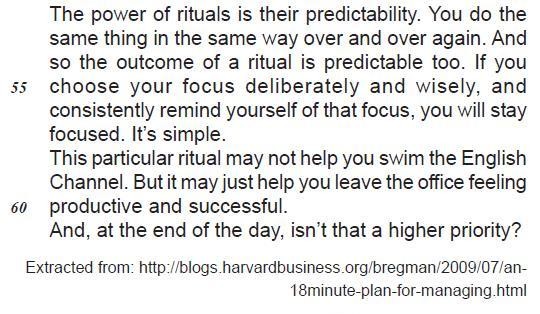
According to paragraph 1, the author had problems at work because he
An 18-Minute Plan for Managing Your Day
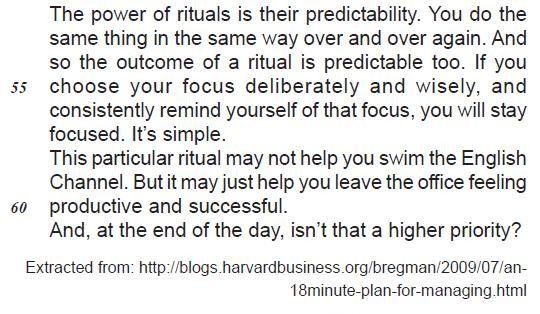
In "But it may just help you leave the office feeling productive and successful." (lines 59-60) may just help could be correctly replaced, by
In the fragment "Moreover, it is hard to call this measure drastic or radical:" (lines 20-21), moreover can be substituted by
The fragment "This means that - in a fair world - we would have to reduce our energy use much more than them." (lines 58-60) implies that
In paragraph 7 (lines 32-40), Ban Ki-moon states that energy services
IMPORTANT NOTICE
CAUTION
PROPERHANDLINGOFTHE FINECARTRIDGES
Handle the FINE Cartridges of this product properly, observing
the cautions noted below. Improper handling causes
malfunction or other problems in the product, as well as
damage to the FINE Cartridges.
Note:
1) When you install the FINE cartridges in the product, insert
the FINE Cartridges into the FINE Cartridge Holder
carefully not to knock them against the sides of the holder.
Also be sure to install them in a well-lit environment.
For details, refer to your setup sheet.
2) Do not attempt to disassemble or modify the FINE
cartridges.
3) Do not handle the FINE Cartridges roughly such as
applying them excessive pressure or dropping them.
4) Do not rinse or wipe the FINE Cartridges.
5) Once you have installed the FINE Cartridges, do not
remove them unnecessarily.
(Taken from Canon Inc. 2008 - Printed in Vietnam)
The words notice (title), hadling (line 2), cartridges (line 2), cautions (line 4) and demage (line 6) could be correctly translated into Portuguese as presented in the option:
According to paragraph 1, the globalization of insurance services has
The author defines the industry conditions in the near term as tenuous, which means they are
WINDOWS 7 REVIEW
Windows 7 gets the basics right. Here's what you need to know
about the new OS.
Harry McCracken, PC World
Monday, October 19, 2009 2:00 pm
What if a new version of Windows didn't try to dazzle
you? What if, instead, it tried to disappear except when you
needed it? Such an operating system would dispense with glitzy
effects in favor of low-key, useful new features. Rather than
pelting you with alerts, warnings, and requests, it would try to
stay out of your face. And if any bundled applications weren't
essential, it would dump 'em.
It's not a what-if scenario. Windows 7, set to arrive on
new PCs and as a shrinkwrapped upgrade on October 22, has a
minimalist feel and attempts to fix annoyances old and new. In
contrast, Windows Vista offered a flashy new interface, but its
poor performance, compatibility gotchas, and lack of compelling
features made some folks regret upgrading and others refuse to
leave WindowsXP.
Windows 7 is hardly flawless. Some features feel
unfinished; others won't realize their potential without heavy
lifting by third parties. And some long-standing annoyances
remain intact. But overall, the final shipping version I test-drove
appears to be the worthy successor to Windows XP that Vista
never was.
(Adapted from
http://www.pcworld.com/article/172602/windows_7_review.html
Windows 7 is hardly flawless pode ser traduzido como

